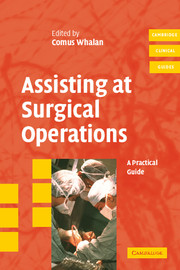Book contents
- Frontmatter
- Contents
- Contributors
- Foreword
- Preface
- PART I Introduction to the operating theatre
- 1 General conduct in the operating theatre
- 2 Universal Precautions
- 3 Clothing in the operating theatre
- 4 Personnel: who's who in the operating theatre
- PART II The operation itself
- PART III Assisting at special types of surgery
- PART IV Immediately after the operation
- Glossary
- Suggested further reading
- References
- Index
2 - Universal Precautions
Published online by Cambridge University Press: 18 December 2009
- Frontmatter
- Contents
- Contributors
- Foreword
- Preface
- PART I Introduction to the operating theatre
- 1 General conduct in the operating theatre
- 2 Universal Precautions
- 3 Clothing in the operating theatre
- 4 Personnel: who's who in the operating theatre
- PART II The operation itself
- PART III Assisting at special types of surgery
- PART IV Immediately after the operation
- Glossary
- Suggested further reading
- References
- Index
Summary
It hardly needs stating that it is possible to acquire disease from your patient during an operation. ‘Universal Precautions’ is the name given to a set of recommendations which are aimed at minimising the risk of this occurring in the operating theatre and elsewhere. The recommendations mainly aim to reduce transmission of blood–borne viral diseases such as HIV/AIDS and the various forms of hepatitis, especially Hepatitis B and C. However, there are other diseases (both known and as yet unknown) against which Universal Precautions will, or at least should, help to protect you. The key principle of Universal Precautions is that every person should be treated as though he or she has one of these diseases, regardless of his or her known or supposed infection status. In the operating theatre, Universal Precautions measures include double–gloving, and wearing a waterproof gown, a mask and proper eye protection such as an eye shield or safety glasses.
Transmissible disease in the operating theatre
This can occur in several different ways, but the commonest are needle–stick injuries and splash of body fluids into the eye. Infection can also be transmitted by the patient's body fluids coming into contact with an open wound (e.g. a cut on the finger with a hole in the glove). For this reason, it is strongly recommended that you follow your hospital's policy on immunisation. Most hospitals advise that you should be immunised against Hepatitis B.
If you suffer a needle–stick injury
Most hospitals have an Occupational Health and Safety Department, and in the larger ones, there is usually a member of that department available after normal office hours.
- Type
- Chapter
- Information
- Assisting at Surgical OperationsA Practical Guide, pp. 9 - 10Publisher: Cambridge University PressPrint publication year: 2006

